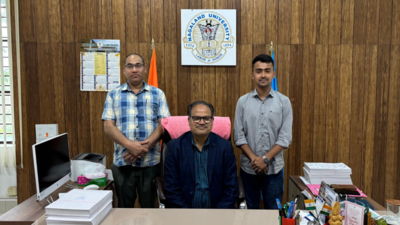Nagaland University researcher secures support from Norwegian Embassy for battery innovation | Mumbai News – Times of India

MUMBAI: Nagaland University researcher Mr. Dipankar Hazarika has secured support from the Norwegian Embassy in New Delhi for his Battery Technologies research. His innovation could significantly impact the development of flexible, wearable and sustainable electronic devices while supporting India’s clean energy storage objectives.

Under Nurul Alam Choudhury’s guidance at the Department of Chemistry, Nagaland University, Mr. Hazarika has received the prestigious ‘Energy Innovation Fellowship Grant’ to advance community-based battery energy storage innovations in India. These local innovative solutions in Battery and Energy Technologies are essential for India to reach its net-zero emissions target by 2070. Battery technology offers transformative potential for community-level energy access, providing sustainable solutions for rural development and livelihood enhancement.His research has achieved laboratory validation with a pending Indian patent. The developed lab-scale prototype demonstrates excellent performance characteristics, including high-rate capability, superior areal capacitance and an impressive 51,500 cycle lifespan at 2 mAcm-2 in an all-solid-state supercapacitor.
Poll
Do you believe that innovative battery technologies can significantly contribute to India’s clean energy goals?
His research was published in the Journal of Power Sources (Q1 Journal, Impact Factor 8.1) titled ‘An ionically cross-linked chitosan hydrogel membrane electrolyte for long-lived electrical double layer capacitors’, co-authored by Mr. Dipankar Hazarika, Duangailung Kamei, Nuphizo Shijoh, and Dr. Nurul Alam Choudhury. Hazarika, currently researching at the Laboratory for Polymer Materials and Renewable Energy, expressed gratitude to the Norwegian Embassy and Nagaland University, stating, “This Fellowship will significantly strengthen my research by providing access to expert mentorship and opportunities for industry linkage. I believe it will help translate my research into a product that contributes to sustainable energy solutions. Going forward, we are going to conduct performance testing under real-world conditions and seek industry collaborations for scaling up the product and taking it to the market so that the country can benefit from this technology.”Hazarika is amongst 13 selected innovators nationwide for this Fellowship Grant. The initiative involves collaboration with Innovation Norway, NITI Aayog, The Energy and Resources Institute (TERI), and Atal Incubation Centres. AIC-SMUTBI serves as the North East regional host, led by Prof. Tej Chingtham.Nagaland University Vice-Chancellor, Prof. Jagadish K. Patnaik, commended the achievement: “I wholeheartedly congratulate Mr. Dipankar Hazarika on this prestigious achievement. This milestone reflects the growing research excellence at Nagaland University and inspires others to pursue impactful science.”The Fellowship provides expert mentorship, including guidance from Dr. Nikhil Tambe, CEO of The Energy Consortium at IIT Madras, focusing on technology scaling and implementation.Prof. Tej Chingtham, CEO of AIC-SMUTBI, acknowledged the support from the Royal Norwegian Embassy, TERI, and NITI Aayog in advancing battery technology innovations in North East India.From over 100 proposals across five Indian regions, 13 innovators were selected. Mr. Hazarika was one of two fellows chosen from the North East for Phase I, with his project ‘Sustainable Biopolymer-based Hydrogel Electrolytes for Next-generation Solid-state Energy Storage’.Dr. Nurul Alam Choudhury highlighted the significance of this research, noting the potential of biopolymers like chitosan, gelatin, starch, and cellulose as sustainable alternatives to petroleum-derived materials.Dr. Choudhury further explained the challenges in electrolyte research, citing complexities in designing stable, safe materials and their lower visibility compared to electrodes.Current liquid-based electrolytes face limitations including leakage, toxicity, and flammability. The Nagaland University research addresses these issues through quasi-solid hydrogel electrolytes, offering a safer, biodegradable alternative. Mr. Hazarika’s chitosan-based hydrogel membrane electrolyte provides leak-proof, non-flammable, biodegradable properties with excellent ionic conductivity of 7.89 mScm-1 and electrochemical stability up to 2.32V.
















